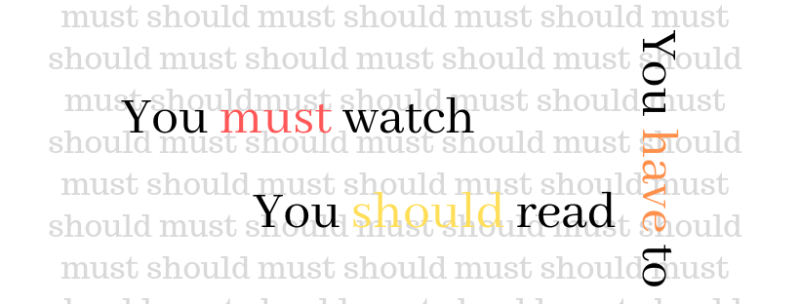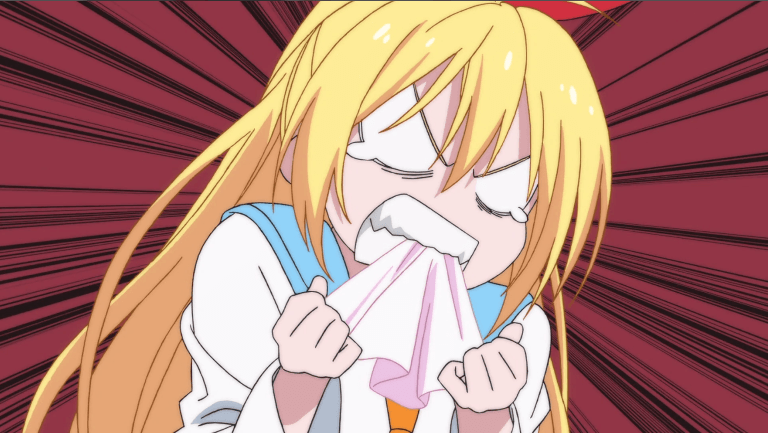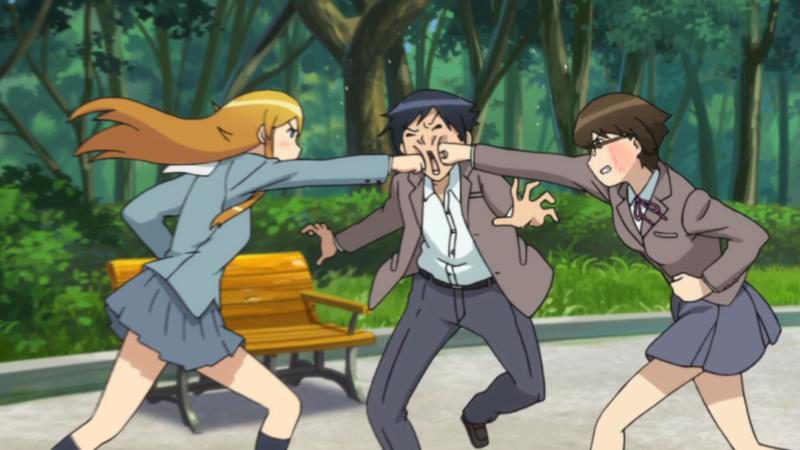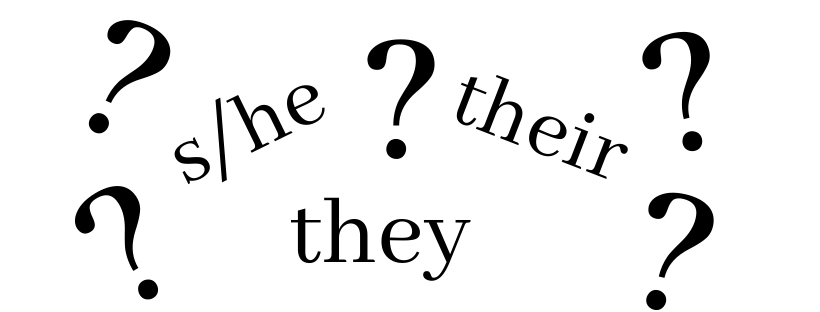
Recently, I attempted to read The Sound and the Fury by William Faulkner because I’ve heard that I must read Faulkner as a writer. People herald him as a great American writer. Frankly, I couldn’t stand the book. It’s nonsensical and drove me crazy with its purposefully bad grammar. Faulkner attempted to write the American southern dialect; it did nothing but distract me and irritate me. My mind kept correcting the grammar as I read, and I’m not a grammar wonk. I like to think I’m fairly sophisticated as a reader (what reader doesn’t?). I’ve read The Tale of Genji, Beowulf, Canterbury Tales, and many Roman authors like Seneca, Marcus Aurelius, and Cicero. But as I tried to read The Sound and the Fury, I could only think of one word: trash. I even wondered if Faulkner would be labeled as a hipster today for breaking the rules of writing just for the sake of art.
That’s the thing about “you must” and “you should.” You should read this. You must watch that. In many cases, I dislike what is lauded by others. It’s not that I dislike things because others like them (for many people that’s a thing). However, many works of art are appreciated because its makes people part of the in-crowd. When I studied art, I knew many people who loved Pollack and Rothko’s works and would speak as if anyone who disliked them didn’t understand art. The “musts” and “shoulds” become a measure of a person’s knowledge instead of a matter of taste. Elitism amounts to your tastes not aligning with others who supposedly know more than you. But when it comes to art and stories, knowledge is secondary to taste. I can understand what Faulkner attempted, but that doesn’t mean I enjoyed the story. However, crowds can pressure you to “like” what you dislike.

In many cases, I just don’t see what makes a piece of art so great. For example, Mark Rothko divided a canvas in half with two colors slathered on it. I’ve seen kindergartners do that. And the result had more expression and character. Frankly,I don’t get what’s special about modern and postmodern art. But I’ve known people who told me I “must” watch Pulp Fiction and Fight Club among other movies. I couldn’t get through either of them. In fact, I fell asleep when I tried watching Pulp Fiction. It bored me that much. My tastes differ.
Of course, we’ve seen this problem in the anime community. Everyone “must” watch Neon Genesis Evangelion or Naruto or FLCL. Those that don’t get sucked into whatever is a must-watch just doesn’t understand anime. It’s the same line used in the art world for those who dislike modern art. It comes down to an us-versus-them mentality and a lack of confidence. Whenever people assert their taste or knowledge as superior, they set themselves apart from the rest of us. In many cases, it shows a lack of confidence in their own tastes. Confident people accept not everyone will or should (there’s that word again!) share their tastes. Confident people don’t need to force others to accept their views. Yet, they also don’t hesitate to present them and let them stand.
I don’t like ecchi and found High School DxD annoying and falling short of its storytelling potential. But if you like it, that’s fine! After all, it defines modern ecchi.

In the anime community and other communities, people wrap their identities around their tastes and defend those tastes against all that vary. Elitism strips down to this. Ironically, elitism acts against becoming elite, that is, gaining superior understanding compared to the rest of the community. Elitism limits people to a small subset while becoming elite (I don’t really care for the word) requires you to explore a topic broadly and with depth. In the case of anime, that means watching stories and genres you dislike (like High School DxD). That’s why I read as much of The Sound and the Fury as I did. I’ve purposefully watched at least a few episodes of anime I knew I would dislike for similar reasons. Some I’ve watched all the way to the end. Others I had to abandon as I had to abandon the book–after all, we each only have so much time to live . Elitism works against knowledge.
For that matter, anime elitism divides people into groups like normies and casuals. However, to understand anime, you have to step outside of anime. Japanese folklore appear in anime, and history has an impact. American culture and Disney have impacted anime. Nothing exists in isolation.
It’s fine to have different tastes and eschew stories you “must” or “should” watch. Elitism can cut the opposite way. You can avoid that which other enjoy. Parts of hipster culture reverse elitism. They avoid what is popular just because it’s popular and eschew people who enjoy those things. Again, it separates people.
That separation attempts to define a person’s identity by what they are not. Taste divides people into camps, and frankly, it’s silly. Everyone is different and some stories will resonate for some of you and not for me. And it’s fine. It’s okay not to like Pulp Fiction, The Sound and the Fury, or Bleach.

Taste reflects your personality. Bibliophiles know a person’s bookshelf can reveal much about a person. How they speak about those books can too. Anytime someone speaks about their tastes in a way that attempts to show off, it only shows a deep lack of confidence. It’s the ego attempting to validate its existence. The funny thing about the ego–it doesn’t really exist. It’s an illusion of separation that sustains itself, but as soon as we accept another’s tastes, the ego starts to dissolve. Shoulds and musts are the ego’s assertions when it comes to taste. Now, this doesn’t mean there aren’t moral shoulds and musts–you must treat everyone with basic respect, you should learn to empathize. But these are different from elitism’s shoulds and musts to a degree. You can become a moral elitist: I admit to being one in my teen years as a legalistic Christian.

I know I’m meandering a bit. Parsing these complex issues require some meandering to cover. “You should” and “You must” are surfaces of deeper mechanics within people and communities. Sometimes they are innocent suggestions from a fan of a story. Other times, these statements come from the ego and a sense of identity. They can divide people into “those who get it” and everyone else. That’s why you see some in the anime community throw around words like “normies” and “casuals” and “weeaboo” and other intended slurs. They use these words to define their own identity by showing who they are not. Likewise taste defines who a person is by what they are not. I can be called a philistine because I dislike modern art. While I don’t understand modern art and often call it nonsense, I try not to disparage those who enjoy and understand it. Confidence accepts another tastes while presenting your own without using absolute, excluding language like “should” and “must.” Religion struggles with these same issues.
You see, while anime is a hobby, it involves people. And people carry their habits and thinking with them. Elitist thinking appears in sports, art, literature, anime, video gaming, tea, coffee, and in just about every human activity. To remedy the issue, we need to be mindful of our behavior and sense of identity. Watching for “should” and “must” in your speech is the first step. Mindfulness will help you build confidence enough to allow others to have different tastes. And confidence will help you empathize with those who still fall into elitist thinking.




I wish more people say that they “can” try this series and such. I’m tired of “should” and “must” a lot thanks to hearing stories about how well-meaning people try to cope with loved ones going through various points of negativity in their lives. They say things like “You should/must cheer up” when that doesn’t really work if the issue is something like depression. They can’t seem to bear the possibility of them going through sadness themselves.
Like you said, it’s a lack of confidence and they seem to be afraid of the idea that something bad can happen to them.
I do feel like people get caught up in the “should/must” thing because they want to share their experiences with someone badly. I myself have gone through this various times. It can be hard to overcome and it’s worth trying to figure who to really connect with when that mentality pops up.
I’ve been guilty of the shoulds and musts despite dealing with depression in the past. In fact, because meditation and mindfulness have freed me from it, I find myself falling into musts and shoulds. It took me 8 years of meditation to “overcome” depression. Sometimes I forget out of my desire to help and say you “must” meditate for at least 2 years before you can claim it doesn’t help. And in the end, this attitude doesn’t help at all. What worked for me won’t work for everyone.
You must read, that is like beauty, everyone has their own definition.